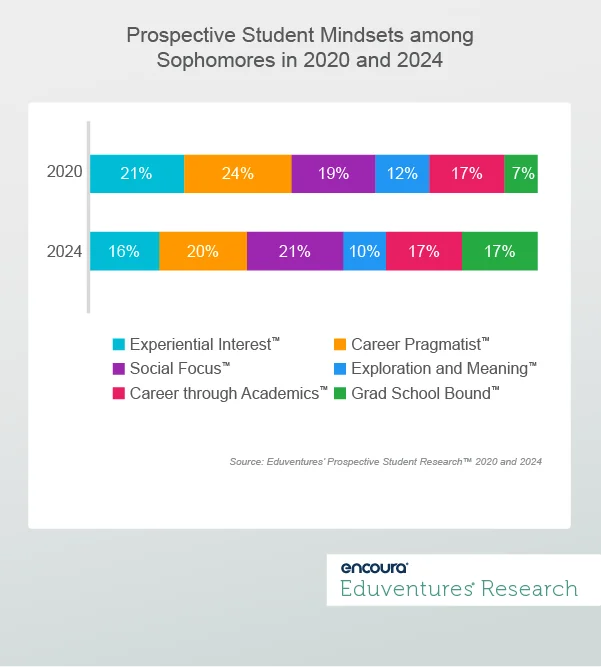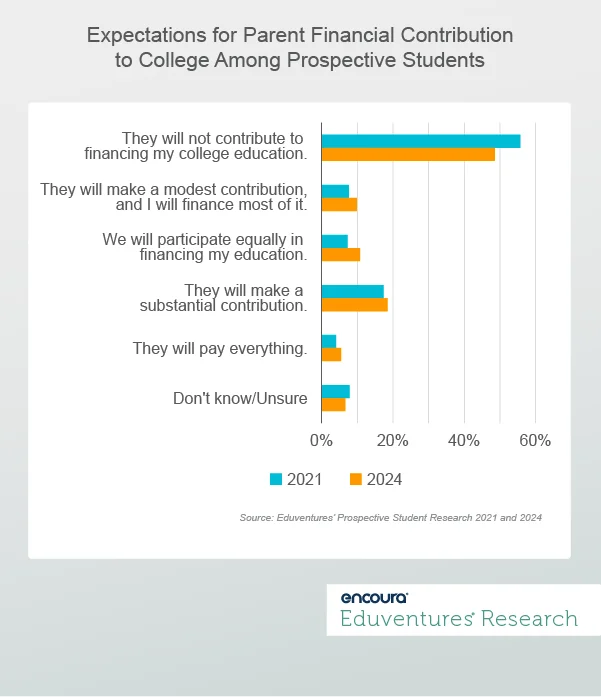The first members of Gen Alpha will be entering high school this fall. Marketing professionals in other industries have already been paying close attention to this rising generation, their purchasing power, and brand affinities. But is higher ed ready to recruit them? And how different are they from their predecessors, Gen Z?
While these students are still too young to participate in Eduventures research, comparing current high school sophomores—the second youngest members of Gen Z according to most cut-offs available—to those from five years ago may give us some clues about what is to come.
What Do We Know About Gen Alpha?
Even more so than their predecessors, this generation has been shaped by the following forces.
- COVID-19. Gen Alpha, widely defined as born between 2010 and 2024, has been deeply shaped by the COVID-19 pandemic. Many within this generation experienced a shift from classroom learning to some form of online learning (and socializing) for an extended period during their formative years. But this was not their first foray into the digital realm.
- True Digital Natives. While Gen Z grew up as digital natives, often surpassing their parents in tech savviness, Gen Alpha is the first generation whose lives have played out in virtual spaces, often from birth. Their baby pictures were shared on social platforms, and many learned to navigate mobile phones or tablets as toddlers. The children of “mommy bloggers” were raised with an online presence.
- Social Justice. Needless to say, digital outreach will remain important. But what will these students care about when it comes to their own futures? The most racially diverse of all generations so far, Gen Alpha is also growing up in a time of a renewed focus on racial and social injustice. Gen Z started to pave the way with a growing interest in activism. Will Gen Alpha step into their shoes?
Internalizing Meaning and Impact
Generational cut-offs are not hard and fast. Students born at the tail end of Gen Z likely have more in common with the oldest Gen Alpha members than they do with early Gen Z members (born in the late 1990s).
For this reason, we looked at the youngest students in our research, current high school sophomores, in comparison to previous sophomores who were in the college pipeline right before the pandemic. Observing shifts in attitudes between these two cohorts can help us predict what Gen Alpha might look like when they enter our research stream over the next couple of years.
Figure 1 shows the Prospective Student Mindsets™ distribution for sophomores in 2024 compared to those in early 2020.
Figure 1.
In just four years, students in the college-bound pipeline have become less pragmatic and experientially focused, and instead care more about academics and the social experience. This can be seen in the decline of Experiential Interest and Career Pragmatist Mindsets and in the growth of Social Focus and, in particular, Grad School Bound Mindsets.
Some of this shift can be attributed to the increasing public notion that higher education may not be worth the cost, helped along by the strong economy. High school students in the Experiential Interest and Career Pragmatist Mindsets, many of whom are first-generation students or from low-income households, are now more likely to enter the labor market directly after high school.
But the demographic shift in the college pipeline is perhaps also characteristic of Gen Alpha who may grow up with less of an implicit expectation that college is what should follow high school. This growing attitude, combined with a shrinking high school demographic, presents a perilous challenge to many institutions. The onus will be on higher education institutions to prove the short- and long-term value of their offerings to a skeptical audience.
Part of that skepticism may be related to the fact that many students can’t count on their parents to pay for college (Figure 2).
Figure 2.
Figure 2 shows that nearly half of high school sophomores (49%) believe their parents will not contribute financially to their college educations. This proportion has declined from 56% in 2021.
More students now, however, believe their parents will at least make a modest contribution. This likely can be attributed to the fact that students from low-income households have disproportionately disappeared from the college pipeline in recent years, leaving more students from high-earning families answering the questions.
And, it emphasizes the importance of engaging the entire family in your recruitment communication in two critical ways:
- Connecting with parents who hold the purse strings. Eduventures research confirms that parents of college-bound high school students are partners in their children’s college searches. Half of millennial parents have considered potential colleges for their children before the junior year in high school. Engaging college-bound parents early may increase your odds of making it onto student application lists.
- Reengaging families who don’t believe college is in the cards. Students from lower-income households more often forgo college because they believe they will not be able to pay the tuition bill or are worried about graduating with large amounts of debt. Educating both students and parents – not only about college financing and the availability of financial aid, but about the short- and long-term benefits of higher education more generally – will be paramount to provide a counter perspective to the growing public notion that college is not worth the cost.
The Bottom Line
It is time to prepare for this rising generation of college prospects. Gen Alpha is coming of age in a highly competitive environment for higher education. These students, and their families, will receive more attention from colleges and universities than other generations before them. This means it will be even more important for individual higher education institutions to stand out from the crowd.
These early data points suggest that we must once again shift value propositions and recruitment conversations to stay relevant. Stay tuned for future posts on this topic.


